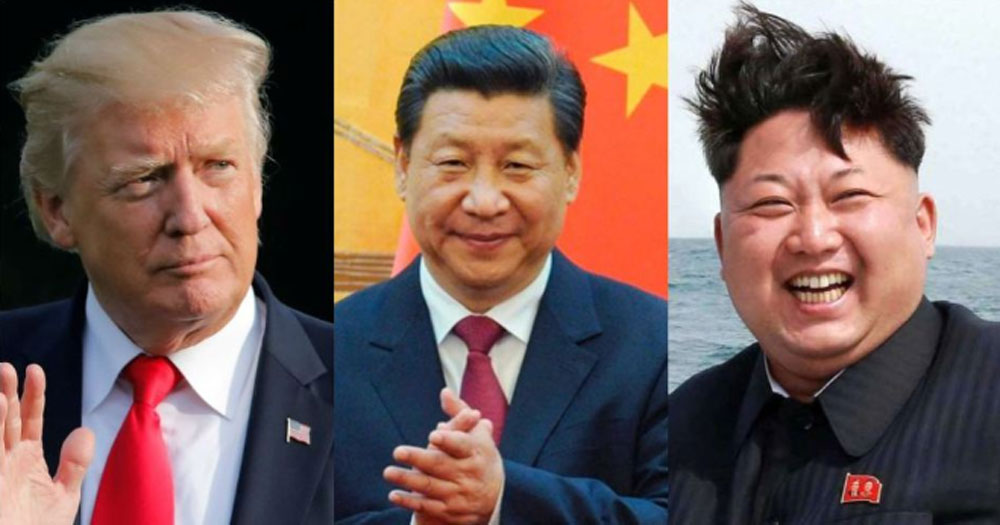Any peace treaty involving the United States and North Korea without China's involvement is invalid and can be overturned, says an editorial published by the Global Times, China's state-run newspaper on Monday (June 4).
There has been speculations that a peace declaration might be signed during the Trump-Kim summit to be held in Capella Hotel on June 12.
According to The Straits Times, South Korean officials told The Wall Street Journal a substantive peace declaration is unlikely given the little time before the summit. That did not stop China from making a statement on a potential peace declaration.
"Without China, a peace declaration will never replace the Korean Armistice Agreement on the technical level," the Global Times says.
The armistice ended hostilities in the Korean War was signed in 1953 by the armed forces of North Korea, China and the US. China was represented by the People's Volunteer Army, which was separate in name from the official People's Liberation Army to avoid official war with the US.
Then-President of South Korea Syngman Rhee refused to sign the armistice, in hope of forming a unified Korea under his government.
Here's China's reasoning: since the 1953 armistice was signed by China, it is invalid to replace the armistice with a new peace treaty without Chinese involvement. So, any declarations of peace are not legal documents. The editorial then asks, what's the meaning of declaring peace if such declaration has no legal effect?
The Global Times editorial stresses this is not a problem of face.
China's not sitting out of this
China does not seem to be quite satisfied with the Panmunjeom Declaration signed a few months ago between Kim Jong-un and South Korean president Moon Jae-in.
"Whether China needs to be the main part of a political declaration signalling the end of hostilities and the state of war is a question worth considering upon," a "core relevant person" from the Blue House, the office of the South Korean president, told the Global Times.
To the state-run newspaper, this means China is excluded from the peace process on the political level despite being called to do the dirty work of signing the peace treaty with actual legal effect. In its words, China has "no room to enjoy the limelight, but when it comes to implementing [peace], [China] has to do all the work".
Maybe that was too much
The Global Times published another editorial on Tuesday (June 5) with a noticeably softer tone.
In this editorial, the Global Times stresses that "to China, the denuclearisation and permanent peace of the peninsula is more important than anything else... China does not care as much as South Korea and the US on whether it is a signatory to the peace treaty."
"To us, it's a good thing for the three parties of North Korea, the US and South Korea to sign a declaration to end the war... But such an declaration is not entirely compatible with a peace treaty to end war on the peninsula, which makes it not exactly legal or certain." the editorial furthered.
Why China wants a finger in the pie
North Korea's turn to more open diplomacy took many by surprise. The exact nature of the relationship between China and North Korea remains elusive, but here are some reasons why China is not very pleased with its exclusion in a possible peace declaration in the Trump-Kim summit.
China's decisions in the UN might have worsened the China-North Korean relationship. Here's what Singapore's former foreign minister George Yeo wrote in May:
North Korea could have availed itself of China’s help at any time but was not prepared to accept China’s condition that it must stop its nuclear weapons program. When China voted in favour of UN Security Council sanctions against the North, their relations became estranged.
It's too simple an observation to say that North Korea is China's vassal state or that they are "allies" in the sense the US uses it to refer to countries like the UK. Whenever Donald Trump pushed China to step up its influence over North Korea, China has always said that the conflict is one that's between North Korea and the United States, and not China.
However China still seeks some control over how other countries deal with North Korea, according to an analysis of the China-North Korean relationship by the American think tank Council on Foreign Relations. Instability and military conflict is the last thing China wants on the Korean Peninsula.
If anything, the Global Times editorials show that there's some ambivalence in China on how much involvement it wants to seek in the Korean Peninsula peace process.
[related_story]
If you like what you read, follow us on Facebook, Instagram, Twitter and Telegram to get the latest updates.

